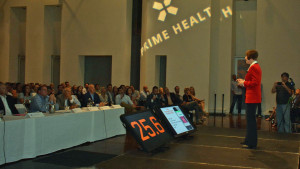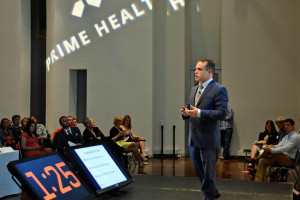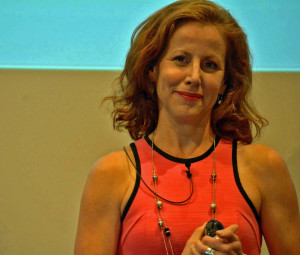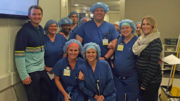DENVER, CO – Hundreds of digital health enthusiasts filled the Denver Art Museum’s Ponti Hall on the evening of September 30th. They had gathered for Prime Health’s Digital Health Challenge, without a doubt the biggest event in Colorado digital health this year.
Mike Biselli, the president of the upcoming health-tech innovation campus Catalyst HTI, and Jeffrey Nathanson, the president of Prime Health, presided over the event, which featured the CEOs of eight digital health startups pitching to a panel of judges from seventeen different healthcare payers and providers.
Each digital health startup had five minutes to convince the panel of judges to host a pilot program proposed by their startup’s CEO. The initial pitch was followed by a five-minute Q&A session, during which time the judges tried to get a sense of how the startup’s product would integrate into the healthcare system.
While only five of the eight finalists in last year’s Digital Health Challenge managed to get their pilot hosted by a healthcare provider, all eight of the finalists at this year’s contest received offers to host their pilots, making the 2015 Digital Health Challenge yet another indication that payers and providers are beginning to recognize the value and importance of digital health technology.
The pilots would be funded by the Colorado Health Foundation, which had generously donated 150,000 dollars to Prime Health for the event. The following is a list of the companies that presented, along with information on the pilots they pitched, as well as the payers and providers who demonstrated an interest in hosting them.
C3LX
“We integrate over 150 different devices,” C3LX CEO Andrew Richburg said as he described his company’s pre-diabetes management platform. “We interact based on the real results of each individual. The platform’s gamified, with challenges that progress and functions that unlock based on the user’s real activity.”
Richburg was looking for 200 participants, a hundred of which would form a treatment group, with the remaining hundred constituting a control group. It was Richburg’s hypothesis that the treatment group would show both a high level of engagement, as well as a high level of weight loss.
Among the institutions interested in hosting the C3LX pilot were HCA, Denver Health, Colorado HealthOP, and Axis Health System.
Radish Systems

CEO of Radish Systems Dr. Theresa Szczurek answers questions from the panel of judges at the Digital Health Challenge.
“Imagine a solution that leverages the power of voice and visuals through smartphones and browsers,” Radish Systems CEO Dr. Theresa Szczurek asked the audience of the 2015 Digital Health Challenge. “You don’t have to imagine anymore, because Radish Systems has introduced ChoiceView. We add visuals to voice for smartphone callers or any browser callers, whether they’re talking to a live person or an automated system.”
Szczurek was seeking a pilot to measure the relative efficacy of voice-with-visuals telephone calls when compared to voice-only calls.
Northwest Colorado Visiting Nurse Association and Clinica Tepeyac both demonstrated an interest in hosting the Radish Systems pilot.
Play-it-Health
“We designed a branded, HIPAA compliant mobile platform, that is more comprehensive than any patient engagement platform on the market,” Play-It Health CEO Dr. Kimberly Gandy claimed during her pitch. “We have tailored reminders, personalized daily education content, proprietary telemedicine intervention, and a robust awards system.”
Gandy was looking for a host institution that would allow Play-It Health to validate their patient-status scoring system.
A variety of institutions demonstrated an interest in hosting the Play-It Health pilot, including HCA, Kaiser Permanente, University of Colorado Health, and Uptown Primary Care.
Novum Concepts
“With our app paramedics are able to send critical data to the emergency room to allow preparation for patients on the individual level,” CEO of Novum Concepts Mike Kobneck explained during his presentation. “What Biophone does is it collects images and videos from the field and sends them to the hospital. Biophone is HIPAA compliant, and uses end-to-end encryption to send the information it collects.”
Kobneck was looking for an 8-month pilot with a hospital, during which time his company would be gathering data on the efficacy of Biophone.
SCL Health and Boulder Community Hospital both expressed an interest in hosting the Novum Concepts pilot.
Physician Cognition
“As far as we know, there is no other system that can process an unlimited number of symptoms, their qualifiers, physical signs, labs, their histories, their medications, one at a time, or all at once,” CEO of Physician Cognition Cameron Powell claimed while pitching his company’s clinical decision support engine Xebra Pro. “IBM Watson can’t do this.”
Powell was looking for fifty clinicians with whom to perform a pilot assessing the accuracy of their diagnoses both with and without Xebra Pro.
Kaiser Permanente expressed an interest in hosting the Physician Cognition pilot.
NextStep.io
“We built a predictive algorithm that sets a goal everyday for each user, and then we paired them with a health coach for accountability,” CEO of NextStep.io John Schnipkoweit explained. “Compared to other health coaching programs we had three times the impact. Within a month we saw a behavior change in 80% of our participants.”
Hypothesizing that diabetes prevention could be achieved through a mobile game, Schnipkoweit was seeking an institution willing to let that hypothesis be tested within their patient population.
A variety of payers and providers demonstrated an interest in hosting NextStep.io’s pilot, including Aetna, University of Colorado Health, SCL Health, Boulder Community Health, Colorado HealthOP, and Aspen Valley Hospital.
Prima-Temp
“Ovu-ring has well-accepted technology,” CEO of Prima-Temp Dr. Lauren Constantini told the audience at the 2015 Digital Health Challenge. “The form factor is an inter-vaginal ring exactly the same as Estring and NuvaRing, which have been on the market for decades. These rings contain medication that produce contraceptive or menopause treatment. We’ve simply taken out the medication and put in a continuous thermometer.”
Constantini was seeking a twenty-subject pilot to test customer preference for Ovu-Ring when compared to traditional methods.
Kaiser Permanente, Denver Health, Aetna Health, and University of Colorado Health all expressed a desire to host the Prima-Temp pilot.
Test Appropriate
“Test Appropriate is a clinical decision support tool that delivers best practices from medical societies to the point-of-care so that physicians can order the most appropriate, cost-effective tests,” Test Appropriate CEO William Brunk told the panel of judges.
“Our hypothesis is simple. If you’re a provider on a cost-sharing model we can demonstrate that the use of our tool is going to generate a rate of return of 10:1 or more,” Brunk stated as he introduced the pilot study he was pitching.
HCA, SCL Health, and Uptown Primary Care were among the institutions interested in hosting the Test Appropriate pilot.
Like the coverage that CyberMed News provides? Follow us on Twitter, LinkedIn, and Facebook to make sure you keep up to date on the most recent developments in Colorado’s digital health community.







Be the first to comment on "Everyone’s a Winner at Prime Health’s 2015 Digital Health Challenge"